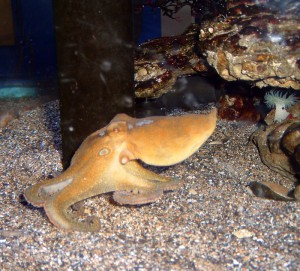In a Letter in Nature magazine last week (August 13, 2015), researchers published surprising findings from a genome analysis of the octopus. As a result, we now know that this invertebrate has more than just behavioral oddities with which to amaze.
In their publication, C. Albertin et al. report the results of genome sequencing of the California two-spot octopus, Octopus bimaculoides. They did not find the predicted whole-genome duplication, but rather an unexpectedly large genome with many rearrangements, and two gene family expansions that were previously thought to exist only in vertebrates.

The Research
Albertin et al. sequenced the O. bimaculoides genome using a whole-genome shotgun approach, and then annotated it using extensive transcriptome sequences from 12 tissues. They estimate that the genome assembly incorporated 97% of protein-coding sequences, and 83% of the entire 2.7gigabase genome. The remaining sequence was composed largely of repetitive elements. Continue reading “Sequencing the Octopus Genome: Invertebrate Intelligence Explained?”
